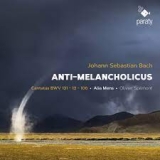Der Albumtitel Anti Melancholicus soll, so die Interpreten, den Willen des Komponisten ausdrücken, dass seine Musik gleichzeitig ästhetisches Vergnügens wie auch spirituelle Entzückung vermittelt. Dabei darf man sagen, dass die Gesangsstimmen diese Idee weitestgehend gelungen umgesetzt haben.
Gleich in der ersten eingespielten Kantate, ‘Aus der Tiefen rufe ich, Herr, zu dir’, setzen sie mit kristallin zugespitzter Artikulation (vor allem massiv rollenden ‘r’s) und dem sensitiv aufeinander abgestimmten Geflecht der Gesangsstimmen auf eine beeindruckende Deutlichkeit des Ausdrucks. Dabei bieten die Musiker in der eröffnenden Sinfonia weitausholende ruhige Linien wie sie in der anschließenden Aria ein bewegt freudiges Singen präsentieren.
Das solistisch mit bis zu neun Instrumentalisten besetzte Orchester trägt diese Sicht mit aufmerksam gestaltetem Spiel mit. Bis dahin handelt es sich um eine erfreuliche Aufnahme.
In den beiden anderen Kantaten dagegen ist ein vollkommen anderes Gestaltungsbild zu erleben, das keinen Gefallen findet. Als ob nun ganz andere Interpreten aktiv sind. Die Sänger strahlen nicht die bisherige Sicherheit der Gestaltung aus. So fällt der junge Altus William Shelton mit einigen kleinen Unsicherheiten in Tongestaltung und Intonation auf.
Vor allem aber verwischt das Instrumentalensemble durch ein zu sehr ausgeprägtes Legato sämtliche Konturen und bietet stattdessen ein stimmliches Gewaber, das gerade der Musik von Bach entgegensteht. Man mag das Maß der protestantisch geprägten Strenge der Welt Bachs und damit seiner Musik im Detail hinterfragen. Wenn es aber gar keine Form mehr gibt und die Musik nur so vor sich hin schwimmt, dann passt das nicht zu Johann Sebastian Bach.
According to the performers, the album title Anti Melancholicus is meant to express the composer’s will that his music should convey aesthetic pleasure as well as spiritual delight at the same time.
It may be said that the vocalists have largely succeeded in realizing this idea. Immediately in the first recorded cantata (Aus der Tiefen rufe ich, Herr, zu dir; From the depths I call to you, Lord), with crystalline pointed articulation (especially massive rolling ‘r’s) and the sensitively coordinated interweaving of the voices, they rely on an impressive clarity of expression. In the opening Sinfonia, they offer expansive, calm lines, just as they present a moving, joyful singing in the following Aria.
The orchestra of up to nine instrumentalists supports this vision with attentive playing. Until then, this is a pleasing recording.
In the other two cantatas, on the other hand, there is a completely different performing that we cannot approve. It is as if completely different interpreters are now active. The singers do not radiate the previous certainty of interpretation. The young alto William Shelton, for example, is conspicuous with some small insecurities in tone shaping and intonation.
Above all, however, the instrumental ensemble blurs all contours with an overly pronounced legato, offering instead a vocal babble that is precisely at odds with Bach’s music. One may question the measure of the Protestant-influenced austerity of Bach’s world and thus of his music in detail. But if there is no form at all and the music just floats along, then this does not fit Johann Sebastian Bach.
























